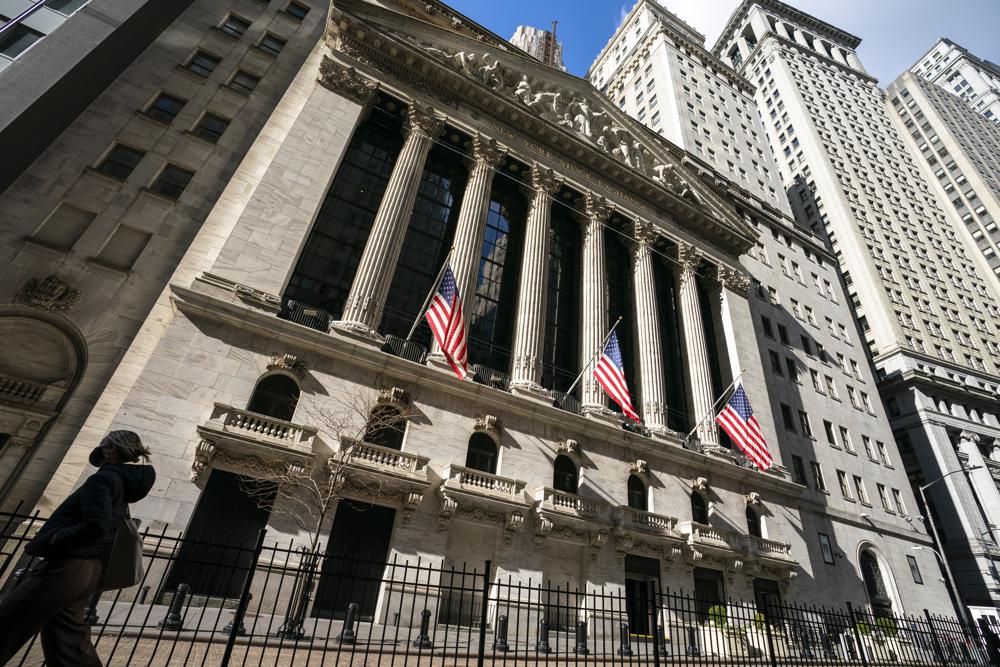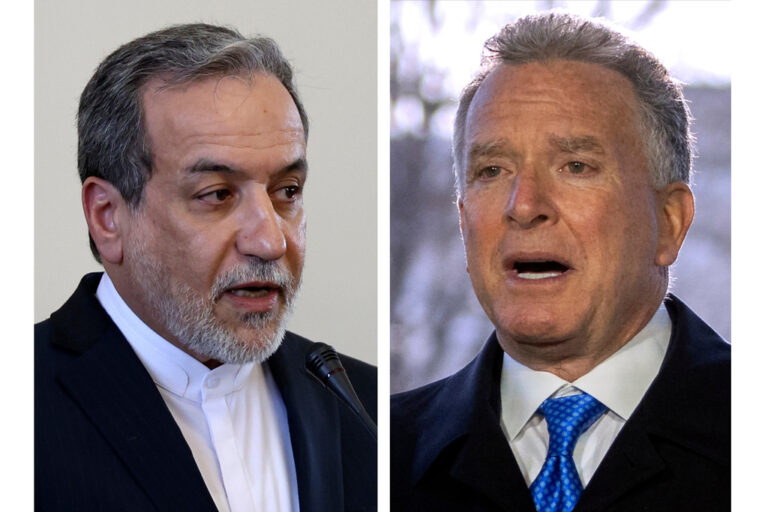Markets quivered Monday amid worries about how high oil prices will go and how badly the global economy will get hit after the U.S. and allies upped the financial pressure on Russia for its invasion of Ukraine. Stocks swung down, up and then back down, and investors herded into bonds in search of safety and the value of the Russian ruble plunged to a record low.
The S&P 500 was 1.3% lower in afternoon trading after Western allies moved over the weekend to block some Russian banks from a key global payments system. The U.S. Treasury Department also announced new and powerful sanctions against Russia’s central bank.
The Biden administration said Germany, France, the UK, Italy, Japan, European Union and others will join the U.S. in hitting Russia’s central bank, which said the Moscow stock exchange would remain closed Monday.
Stocks on Wall Street trimmed their losses through the morning, at one point flipping to modest gains, after big tech stocks and others that benefit most from low interest rates rallied. The war in Ukraine is raising expectations that the Federal Reserve may have to take it more slowly in its campaign to raise interest rates in order to fight inflation.
Other markets were showing more fear about the rising antagonism between Russia and the U.S. and its allies.
Oil prices on both sides of the Atlantic climbed more than 4% amid concerns about what will happen to crude supplies, because Russia is one of the world’s largest energy producers. That’s upping the pressure on the already high inflation squeezing households around the world.
In search of safer returns, investors plowed into U.S. government bonds, which drove the yield of the 10-year Treasury down about 0.12 percentage points to 1.86%, on pace for one of its sharpest drops since the omicron coronavirus variant first rattled investors. Gold rose 0.7%.
They’re just the latest sharp swings for markets, which were relaxing in relief just on Friday, in part on thoughts that sanctions against Russia weren’t as severe as they could have been. More sharp turns are likely in the hours and days ahead given all the uncertainty about the war.
“Right now the situation is fluid and investors are looking for the next shoe to drop,” said Barry Bannister, chief equity strategist at Stifel.
The pressure on Russia isn’t coming only from governments. London-based energy giant BP said Sunday it would dump its investment in Rosneft, a Russian energy company. BP has held a nearly 20% stake in Rosneft since 2013, and its shares listed in London fell 3.9%.
European stocks broadly have fallen more sharply than their U.S. counterparts given how much more closely tied Europe’s economy is to Russia and Ukraine. Germany’s DAX dropped 0.7%, France’s CAC 40 fell 1.4% and the FTSE 100 in London lost 0.4%.
In the U.S., the Dow Jones Industrial Average was down 581 points, or 1.7%, at 33,481, as of 2:11 p.m. Eastern time. The Nasdaq composite was 1% lower.
Markets had already been on edge before Russia’s invasion, worried about upcoming hikes in interest rates by the Federal Reserve, which would be the first since 2018.
Fed Chair Jerome Powell is scheduled to testify before Congress later this week, where he could offer clues on the path for interest rates. A report on Friday will also show whether strength in the U.S. jobs market continued in February, which would give the Fed more leeway to raise rates.
The Fed is caught on a narrow tightrope, needing to raise rates enough to stamp out high inflation but not by so much as to choke the economy into a recession. Higher rates also put downward pressure on all kinds of investments from stocks to cryptocurrencies.
Given the uncertainty surrounding Ukraine, investors have sharply pared back bets the Fed will raise rates in March by double the usual increase. Traders are now forecasting just a 10.4% chance of that, according to CME Group. A day earlier, they were pricing in a 24% probability.
“Expectations are that central banks are going to take a somewhat slower and more cautious approach as a result of this crisis, so that provides a positive offset for risky assets,” Jonas Golterman, senior global markets economist at Capital Economics, said in an online briefing Monday.
That initially helped high-growth tech stocks and others that soared in recent years in large part due to low interest rates notch gains. Tesla jumped 6%, though big tech stocks like Nvidia were swinging from losses to gains and back again. The chipmaker fell 1.3%.
Tesla also benefited from the higher oil prices, as did other electric-vehicle makers, solar-power companies and producers of oil. Energy stocks in the S&P 500 jumped 1%, the only sector in the index with a gain.
Defense-related companies also gained, with Lockheed Martin up 4.2%.
Financial analysts say wars and other such scary geopolitical events tend to have only a temporary effect on markets, perhaps lasting weeks or months. But in the moment, fear is nevertheless still higher.
Putin’s order that Russian nuclear weapons stand at increased readiness to launch ratcheted up tensions with Europe and the United States and revived dormant fears from the Cold War era.
The Russian central bank raised its key rate to 20% from 9.5% in a desperate attempt to shore up the plummeting ruble and prevent a run on banks. The Russian currency plunged at one point plunged below 0.9 cents before climbing back to a shade above a penny, though still down nearly 15%.
The ruble had plunged more than 30% after the move to block Russian banks from the SWIFT payments system. Among other things, the sanctions are meant to crimp the Russian central bank’s access to over $600 billion in reserves and hinder its ability to support the ruble.
(AP)












One Response
Except for countries heavily invested in, or dependent on trade, with countries the US is on the verge of war with – the opportunities for corporate profits abound. War is profitable unless your country gets crushed. Just increasing the military to Cold War levels will remove a million adults from the work force, and do much to raise wages substantially. While the US won’t have shortages, the global price of grains, gas and oil will soar creating opportunities for business to come up with substitute goods, and raise prices and profits. The primary factor affecting stocks is the profitability of the companies, and as a famous (still frum) investor said, “Buy when there’s blood in the streets”.